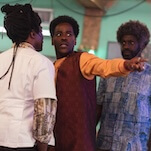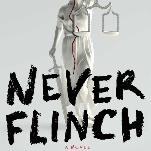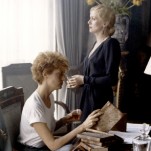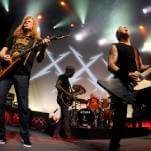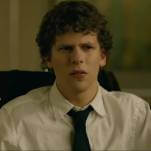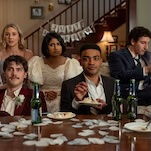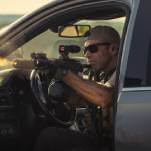Though Joe Dante rarely gets the chance to apply his anarchic sensibility to mainstream Hollywood movies any more, the director of The Howling, Innerspace, Gremlins, and Small Soldiers keeps busy. In recent years, Dante has been enjoying the freedom afforded by cable TV, and specifically Showtime's Masters Of Horror series, for which he's masterminded two of the higher-profile episodes, "Homecoming" and "The Screwfly Solution," both adapted by screenwriter Sam Hamm from short stories Dante chose. The former posits a world where dead soldiers come back to life and demand to vote for anyone who'll stop the war, while the latter—now on DVD—imagines a disease that replaces the male sex drive with an impulse to murder, cloaked in holy rhetoric. Dante spoke with The A.V. Club about "The Screwfly Solution," making agit-prop on a small budget, and whether he'll ever work within the studio system again.
AVC: The Screwfly Solution seems more complicated, especially in the way it implies that the epidemic of religion-inspired violence isn't caused by religion. Instead, religious fervor is just a symptom of excessive "maleness," as it were.
JD: I think this one probably operates on a slightly higher level than my previous one. The original short story, written by a writer named Alice Sheldon—who published under the name James Tiptree Jr., and was thought by her colleagues for many years to be a male—is very provocative and clever. I'm really surprised that, as far as I know, none of her other work had been adapted for films or television. The material is so good. The stories are all so interesting and come from such an unusual point of view that I just find it hard to believe that nobody has mined this particular source before. Then again, the first year we were doing Masters Of Horror, this was the story I wanted to do, and we couldn't get the rights. I don't know if something happened and the rights loosened up, or maybe it's just that the people who hold the copyright don't want anyone else doing dramatizations of these stories. But there are a number of other stories of hers that I think would make awfully good TV shows or movies.
AVC: What keeps drawing you to this particular story?
JD: It's one of those evergreens. The issues it deals with haven't changed much from '77 until now. The issue of sexuality and violence, the male prerogative… It's not stuff that's ordinarily dealt with, even in fiction. I think if I'd waited five more years to do it, it would still be timely.
AVC: It's hard to shake the image in the film of a man in a strip club pounding himself in the crotch with barbed wire.
JD: Yeah, on Masters Of Horror, we do get suggestions from Showtime, which we don't have to take. One of their suggestions was, "We don't really need that." [Laughs.] But I said, "Yeah, I think we do." Actually, there isn't that much violence in the show. It's all pretty much concentrated in one spot, and it has to be fairly horrific in order to be able to make its point. Once you've established what that level is, you can always just hint that you're going to do it again, and it'll keep people on edge.
AVC: As a whole, the film does seem darker in tone than your other work. And a little different in look too, with all the handheld shots.
JD: A lot of my stuff has jokey aspects. Sometimes the jokes are on the surface, sometimes underneath, but I generally have a fairly absurdist worldview, and there's a certain whimsical quality that creeps into most of my stuff. The Screwfly Solution didn't seem to lend itself to that at all. I wanted it to be a little more immediate and a little more realistic-looking. The look of the episode, which was shot on HD instead of film, basically came out of my desire to shoot some of it with a cell phone, and though I quickly realized that would not probably look very good on high-def television, we still sort of thought, "Well, maybe this high-def thing would be a good way to do it."
I'm quite a film guy. I was the last one to switch over from Moviolas to video editing. But I have to say that I was very impressed with the quality of these HD cameras. The show has a distinctive quality that I don't think it would have if we'd shot it on film, even if we'd done the camera moves the same way. Because there's certain things about the lightweight quality of the camera, and how you can get it into corners and put it in places that you really can't fit a film camera. Film cameras have a magazine, while the HD cameras just have a little card that you put in and take out. If you wanted to, you could just keep it running and do like Russian Ark. [Laughs.] A 60-minute take, if you could get it to work! I really enjoyed it, and I would definitely think of using hi-def again, for the right project.
AVC: Do you think that switching to digital might give you the opportunity to make the kind of feature films you've been kept from making over the past several years?
JD: Well, when filmmakers are kept from making films, there's a lot of different reasons why. [Laughs.] People don't realize that you can spend a lot of time preparing movies that actually don't get made. Sometimes you work on a film and cast it and do all the work and can be just a month away from shooting, and all of a sudden, the whole thing goes up in smoke. Sometimes it goes up in smoke during the shoot, and you never see the end of it. That's increasingly common. But I do think the advent of this digital revolution is going to provide people with opportunities to make films that they never would have had before. I think you can do some pretty credible stuff now with very, very little money. Which I think is great for young filmmakers. I remember when Francis Coppola was saying, "Everybody is going to make their own film," and he was thinking of 8mm! [Laughs.] Which is pretty limiting. I mean this digital stuff can look great.
AVC: In general, TV has been as big a part of your filmography as feature films. Are you comfortable with that balance?
JD: Yeah. I think I entered the market around the time when there was getting to be less snobbery about the difference between feature films and television. And after the Jaws/Star Wars revolution, when everything had to be a spectacle aimed at young kids, television became the place to go for real content. Just look at last year's movie output. The majority of the stuff aimed at adults didn't go over. It only takes one All The King's Men to prevent any literary source from being adapted into a movie for another year. With the rise of HBO and Showtime and all the other cable networks, I think there's been a lot more receptivity on television to interesting adult stories that in the '60s and '70s would have been made into feature films. I have no problem jumping back and forth. If anything, I find it less restrictive working in television.
AVC: What are your own movie-going habits these days?
JD: I go a lot. I'm probably one of the last holdouts who goes at least twice a week if I can. I do find that I'm less likely to see something with a number after it than I am to try something new. I go to a lot of independents and foreign films. I really try to keep up and see what there is to see. And there's some gems. For every Big Momma's House—or maybe every three Big Momma's Houses—there's always a Pan's Labyrinth or something that's really meaty and interesting and makes you want to make movies again. If you really love movies, it's the act of watching them that you really love. You can sit and watch a B-Western and have just as much fun watching that as you can a classic. That minute when the lights go down is the part where the magic happens, because you know this could be great. You're always kind of excited, like, "Here I am again in the church of movies, and Mass is starting."
AVC: What makes a film a Joe Dante film? What have you noticed about your own work that would qualify as a "signature?"
JD: Oh God, I don't know. A movie that looks like it was made by a guy who read too many copies of Mad magazine? [Laughs.] I don't know, it's hard to say. Film festivals sometimes invite you and they want to run a bunch of your movies, so you're sort of trapped having to watch them. I would probably be able to recognize one of my own movies, in the same sense that I can recognize a Frank Tashlin movie or a Billy Wilder movie. There are certain directors where you can turn on the TV and you can kind of tell from the cast and the lighting and the tone that this is a movie by so-and-so. And I do think my movies have that kind of distinction.
That doesn't necessarily mean they're good. [Laughs.] It just means they have a personality, which I think is credible. Movies cost so much that studios really try to impose their personality over yours. A lot of times, you can get swallowed up in that and end up making movies that are indistinguishable from anybody else's. One of the things I've always tried to do is to inject myself as much as possible into the movie, so I feel like it's mine. But that also comes from what you choose to do and what you choose not to do. There are certain projects I could have said yes to, and I know exactly how they would have turned out: exactly the way they turned out when someone else did them. [Laughs.]
AVC: On the IMDB, it says your next project is The Greatest Show Ever. Is that true?
JD: Those guys input whatever they see in the trades. The Greatest Show Ever is a sort of multi-story thing, like Amazon Woman On The Moon and Kentucky Fried Movie. I did a segment with Mickey Rooney that couldn't have lasted more than three minutes. If the rest of the movie ever gets financed and finished, my piece will be in there. People keep reminding me I did it, but that was over a year ago, and I keep forgetting. I suppose it'll be on my IMDB filmography as my next movie for the next 12 years.
AVC: Do you have any "next movies" that aren't on your IMDB filmography?
JD: I have many, many "next movies" that aren't on my filmography. Whether they'll ever be on my filmography is another question. When you try to raise financing yourself, as opposed to going through the system, it's a whole different deal. I've got some projects that I really like that are in various stages of "partly financed," "not financed," "being read around town," that kind of thing. What you do to make ends meet is do a Masters Of Horror in between. [Laughs.]
AVC: If you list a title here, it will be on the IMDB by tomorrow.
JD: I know, that's why I'm not gonna. [Laughs.]
























